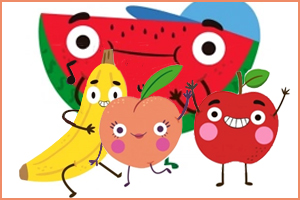By Setareh Kiumarsi
This is the second post in a series about our common food habits and the mistakes we often make. The topic of this article is fruit. (You can read the previous article here.)
In our minds, fruit and vegetables automatically equal healthy eating. Vegetarianism is growing in popularity, and with it, fruit has become more beloved than ever. (You can check out our series on vegetarianism here.)
But did you know that you shouldn’t eat fruit along with or right after other foods?
Fruits are very light and digest quickly—within about an hour. They’re absorbed in the stomach. In contrast, most other foods take 5 to 6 hours to digest and are absorbed later in the small and large intestines.
When you eat fruit with other foods or after a meal, the fruit ends up fermenting in the stomach, which disrupts the digestion of your previous meal. This leads to the formation of toxins and undigested phlegm in the digestive tract.
So when and how should we eat fruit?
Always eat fruit on its own, and at least an hour before any other food.
Avoid combining yogurt with fruit.
Don’t mix strawberries (or other fruits) with cream.
In smoothies, don’t blend fruit with milk, ice cream, or vegetables.
The only fruits that are considered okay to mix with milk are mulberries, dates, sweet mango, and figs, but note that these combinations are heavy and fattening.
What about watermelon, cantaloupe, and melon?
Oh, how refreshing watermelon, cantaloupe, and melon are—especially in hot weather! Even if it’s not summer, there’s always Yalda Night and its beloved watermelon.
But have you ever noticed that eating watermelon after a meal causes acid reflux, or that melon or cantaloupe after food makes your throat itch or your mouth water too much?
In Ayurveda, it’s strongly advised not to eat watermelon, cantaloupe, or melon with or after other foods. Even more, it’s recommended not to mix them with other fruits—or even with each other. They should always be eaten alone.
Why? Because these fruits digest even faster than other fruits, and combining them slows digestion and causes disruption in the gut.
So how should you eat these fruits?
Eat them as a standalone snack, at least 3 hours after meals and 1 hour before your next meal, and ideally not at night.
Sprinkle a bit of salt on watermelon and chew and swallow a few of the seeds for better digestion.
Sprinkle salt and a pinch of cardamom or cumin on cantaloupe and melon.
Avoid eating bread and cheese with watermelon, or bread with melon or cantaloupe—these combos are especially heavy and disruptive.
Now, what about cucumber, the fruit in disguise?
As kids, we’d always have a cucumber in one hand and another fruit in the other. But is cucumber even a fruit to begin with? Why do we include it on fruit platters?
As mentioned above, fruit should be eaten alone, and that includes cucumber.
Don’t eat cucumber with other fruits.
If you tend to have a cold constitution, slow metabolism, or experience frequent bloating, avoid raw cucumber. Treat it like zucchini: cook it with warming spices like turmeric, cinnamon, cumin, thyme, etc., and combine it with warming vegetables like carrot, parsley, basil, cress, and savory.
In cold seasons, reduce your cucumber intake.
If you have low blood pressure, go easy on cucumber—it’s a natural blood pressure reducer.
In summer, though, cucumber helps cool the body down. Just make sure to eat it with its peel, since that’s its natural digestive balancer. Sprinkle it with salt and fennel.
Or, make a cooling summer drink: in a glass of water, mix 1 tsp lemon juice, 1 tsp grape syrup, a pinch of salt, 1 tbsp rosewater, and 2 tbsp grated raw cucumber with its peel. Sip and enjoy on hot summer days.
Save a couple slices of cucumber, lie down, close your eyes, and place them on your eyelids while you take a few deep breaths.
So remember: fruit is incredibly healthy—but how and when you eat it matters.
Please be sure to credit the author, Setareh Kiumarsi, when sharing or republishing this article, which was written with love and the hope of well-being for all.







